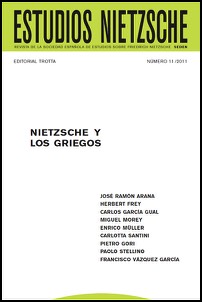Nietzsche’s New View of Ancient Greece. The Archaic Period as Counterimage of the Classic Age
DOI:
https://doi.org/10.24310/EstudiosNIETen.vi11.10497Keywords:
neohumanism, classical armony, tragic visionAbstract
This article tries to show that Nietzsche’s interpretation of Greek antiquity represents a new interpretation and at the same time a reinvention of the ancient Greeks. The central thesis of his interpretation is that the most important achievements of Greek culture were created in the sixth and fifth century before our era. A time which Nietzsche understood as tragic or arcaic. At the same time this article stresses that the reinvention
of the Greeks by Nietzsche represents a polemic against neohumanism and the classical philology of his time. Against the armonic vision of classic antiquity Nietzsche develops an image of the Greeks which emphasizes the dark and cruel sides of the Ancient world. Thus he moves the tragic world view of the Greeks to the center of his analysis.
Downloads
Metrics
References
Benne, C., Nietzsche und die historisch-kritische Philologie, Berlin: W. de Gruyter , 2005.
Benne, C., Nietzsche und die historisch-kritische Philologie, Berlin: W. de Gruyter, 2005, p. 289.
Bollenbeck, G., Bildung und Kultur, Glanz und Elend eines deutschen Deutungsmusters, Frankfurt: Suhrkamp, 1996.
Burger, R., Im Namen der Geschichte. Vom Mi?brauch historischer Vernunft, Hannover: Klampen, 2007.
Frey, H., Nietzsche, Eros y Occidente, México: Porrúa, 2001.
Gerhardt, V., Friedrich Nietzsche, Munich: Beck, 1995.
Gründer, K., Der Streit um Nietzsches Geburt der Tragödie, Hildesheim: G. Ohlms, 1969.
Köster, P., Kontroversen um Nietzsche. Untersuchungen zur theologischen Rezeption, Zürich: Theologischer Verlag, 2003.
Lange, W., «Tod ist bei Göttern immer nur ein Vorurteil. Zum Komplex des Mythos bei Nietzsche”, en K. M. Bohrer, Mythos und Moderne, Suhrkamp: Frankfurt, 1983.
Löwith, K., Nietzsches Philosophie der ewigen Wiederkehr des Gleichen, Hamburg: Felix Meiner, 1986.
Müller E., «Neuerscheinungen zu Nietzsches Bild der Antike», en Nietzsche-Studien 31 (2002), 350-362. T
Nietzsche, F., Obras Completas, I-IV (OC ). Director ed. Diego Sánchez Meca. Madrid: Tecnos, 2011-2016
Nietzsche, F., Correspondencia I-VI. (CO). Director ed. Luis E. de Santiago Guervós. Madrid : Trotta, 2005- 2012.
Nietzsche, F., Fragmentos Póstumos I-IV (FP). Director ed. Diego Sánchez Meca. Madrid: Tecnos, 2006-2010.
Ottmann, H., Philosophie und Politik bei Nietzsche, Berlin: W. de Gruyter, 1999, pp. 43-44.
Porter, J. L., The Invention of Dionysus. An Essay on the Birth of Tragedie, Stanford Univ. Press, 2000.
Ries, W., Nietzsche für Anfänger. Die Geburt der Tragödie, München: Dtv, 1999.
Ringer, F. K., Die Gelehrten. Der Niedergang der deutschen Mandarine, München: dtv/Klett Cotta, 1987.
Schmidt, H. J., Nietzsche Absconditus oder Spurenlesen bei Nietzsche. Kindheit, Teil 3, Berlin – Ashaftenburg: IBDK Verlag, 1991.
White, H., Metahistory, Frankfurt: S. Fischer, 1991.
Wohlfahrt, G., Das spielende Kind. Nietzsche: Postvorsokratiker – Vorpostmoderner, Essen: Vulkan, 1999.
Downloads
Published
How to Cite
Issue
Section
License
As of issue 21 (2021) this journal is published only in open access (diamond route).
From that number 21, like the previous numbers published in NIETZSCHE STUDIES, they are subject to the Creative Commons Acknowledgment-NoComercia-ShareIgual 4.0 license, the full text of which can be consulted at <http://creativecommons.org/licenses/by-nc-sa/4.0 >
It is the responsibility of the authors to obtain the necessary permissions of the images that are subject to copyright.
This work is licensed under a Creative Commons Attribution-NonCommercial-ShareAlike 4.0 International License.
Copyright generates two different rights: moral rights and patrimonial rights that EJFB recognizes and respects. Moral rights are those relating to the recognition of the authorship. They are rights of a personal nature that are perpetual, inalienable, unseizable and imprescriptible as consequence of the indivisible union of the author and his/her work.
Patrimonial rights are those that can be derived from the reproduction, distribution, adaptation or communication of the work, among others.







11.png)
